Russian foreign minister Sergei Lavrov today (9 March) travels to Abu Dhabi for the start of a tour of Arab Gulf countries. After the UAE the Russian minister will also visit Saudi Arabia and Qatar.
The time when the Gulf was a British – and later an American – "lake" is long gone, but the visits represent a new level of Russian engagement with the region. The foreign ministers of the three countries paid separate visits to Moscow this winter, despite a lull in diplomatic activity due to the pandemic.
According to the Russian Foreign Ministry, Lavrov’s meetings in the UAE are to become an important part of bilateral political dialogue, during which Russian President Vladimir Putin maintains "regular trust-based contacts" with leaders of Arab monarchies.
The Russian news agency TASS, said that among other things, the sides will discuss ways to further increase business co-operation in line with agreements previously reached at the top level. Despite obstacles created by the novel coronavirus pandemic, Russia-UAE trade increased by 78% in the past year, reaching all-time high of $3.27 billion. The Russian side also confirmed previously announced plans to hold later this year a regular plenary session of a bilateral intergovernmental commission on trade, economic and technical co-operation. The commission’s previous meeting took place in October 2019.
The sides will also discuss new projects in a wide range of economic sectors, such as power generation, industry, agriculture, infrastructure and peaceful use of space. Special emphasis will be placed on cultural and humanitarian ties as well.
Lavrov pushes the Russian Collective Security Concept for the Persian Gulf region.
Diplomats from Moscow and Abu Dhabi will also carry out a detailed exchange of opinions about key aspects on the global and Middle Eastern agenda. "The emphasis will be placed on the need to resolve the existing conflicts in the Middle East and North Africa through inclusive dialogue, taking into account legitimate interests and concerns of all parties involved," the Russian Foreign Ministry said. "From this angle, it is planned to consider the situation in Syria, Libya, Yemen and the Arab-Israeli conflict."
The sides will pay special attention to the issue of sustainable stability in the region. Approximately 18 months ago, Moscow unveiled its updated "Russian Collective Security Concept for the Persian Gulf region". It envisages a collective mechanism of response to challenges and threats with the participation of regional states, including Iran and all Arab countries.
"We consistently urge to refrain from confrontational rhetoric, to address at the negotiating table all issues that had accumulated and [call upon] all states of the sub-region to engage into building a system of collective security and joint response to existing challenges and threats," the ministry said.
The Russian foreign ministry said that Russia’s regional security initiatives received a positive feedback in the United Arab Emirates. Following his visit to Moscow, the UAE top diplomat said his country welcomed Moscow’s efforts in this domain, the Ministry said.
source: commonspace.eu with TASS news agency (Moscow)
photo: Foreign Minister Sergei Lavrov with Gulf dignitaries during a visit to the region in 2019 (picture courtesy of TASS Moscow)






